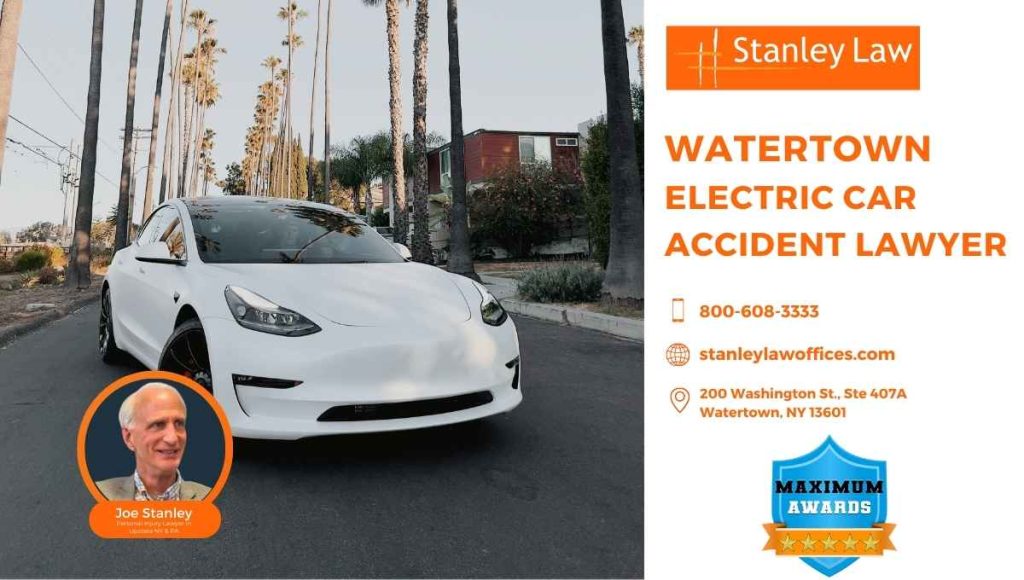In recent years, electric car accidents have been on the rise in Watertown. The new and advanced technologies in cars that allow users to take a passive role in driving have been contributing to this fact. Another side effect of these technologies is their indirect complication in the aftermath of accidents, particularly in claiming compensation. Therefore, it would be a wise decision to get as much help as you can to ensure that you get the compensation you deserve. Our team is here to help you understand your rights and explore your legal options. We have extensive experience with electric car accident cases and can support you. Whether you are dealing with medical bills, repair costs, or insurance issues, our Watertown electric car accident lawyer is ready to guide you through every step.
Electric Vehicle Accident Rights and Legal Options
If you have been in an electric vehicle (EV) accident in Watertown, whether you were driving or riding as a passenger, you have the right to claim compensation for any damages and other expenses caused by the accident. This can also cover ongoing treatment if you need to get absolute bed rest and refrain from engaging in any activities. According to the New York State Department of Motor Vehicles (DMV), all motorists, including EV drivers, must adhere to state traffic laws, and victims of car accidents may file claims for damages.
New York law also allows accident victims to file claims against negligent drivers, faulty car parts, or even manufacturers if a defect played a role in the crash. The federal government also requires electric cars, like traditional vehicles, to meet federal safety standards. However, defects can still occur, leading to recalls and potential liability claims. If your accident involved a manufacturer defect, you may even claim compensation under the relevant provisions of product liability laws.
Navigating these claims can be complex, but you don’t have to do it alone. Our firm is here to guide you through every step with care and compassion, ensuring you understand your rights and receive the support and justice you deserve.
Understanding Local Electric Vehicle Laws
New York has implemented specific regulations around EVs to ensure safety and accountability on the road. In Watertown, as in the rest of the state, these laws play a crucial role in electric car accident cases by outlining how EVs should be operated and maintained. The New York State Department of Motor Vehicles (DMV) mandates that EVs meet strict safety standards, covering essential components such as high-voltage batteries, charging systems, and crash response protocols.
Understanding these regulations is critical when determining liability in an accident. For example, if an accident was caused by a malfunctioning battery or a faulty charging station, legal responsibility could extend beyond the drivers involved to manufacturers, service providers, or even charging station operators.
Navigating such complicated legal requirements can be overwhelming, especially when you are recovering. Therefore, it is advisable to hire a lawyer to help. Our firm has extensive experience navigating New York’s electric vehicle laws. However the case may be, we are here to help you understand your rights and fight for the compensation you deserve.
Common Causes and Legal Impacts of Electric Vehicle Accidents
Electric vehicles (EVs) are becoming popular for their environmental benefits and lower costs. However, they come with unique risks that can lead to accidents. Understanding these risks can help drivers stay safe and manage legal claims. Here are common causes of electric car accidents:
- Battery Fires
EVs use high-voltage lithium-ion batteries. If these batteries are damaged in a crash or have a manufacturing flaw, they can catch fire. These fires burn very hot and can be hard to put out, which is dangerous for passengers and emergency responders. These battery fires, while rare, require specialized firefighting techniques compared to traditional gasoline fires. - Electrical Malfunctions
Electric Cars have complex electrical systems, which can sometimes fail. Problems like faulty wiring or software bugs can lead to sudden issues, such as the vehicle shutting down, problems with braking, or loss of acceleration, increasing the risk of accidents. The U.S. Department of Transportation provides guidelines on EV safety standards to mitigate such risks. - Power Loss While Driving
EVs rely solely on battery power, unlike traditional gas-powered cars. If a battery runs out too quickly or there’s a technical problem that causes a sudden loss of power, it can affect important functions like steering and braking. This is especially dangerous when driving fast or in heavy traffic. As the U.S. Environmental Protection Agency advises, regular battery maintenance and monitoring can help prevent unexpected power loss. - Autonomous System Errors
Many electric vehicles (EVs) have driver assistance systems, such as autopilot and lane-keeping. While these features improve safety, they can sometimes fail. If the system misses obstacles, misreads lane markings, or shuts off unexpectedly, accidents can happen. Responsibility may lie with both the driver and the manufacturer, depending on the situation. - Driver Inexperience with EVs
Electric cars drive differently than gas-powered cars due to their instant torque and regenerative braking. Drivers unfamiliar with these features may misjudge acceleration and braking distances or miss pedestrian warnings. New electric vehicle drivers should learn their car’s features to reduce accident risks.
For official guidelines on electric vehicle safety, visit the National Highway Traffic Safety Administration and the Federal Motor Carrier Safety Administration. If you need legal assistance after an accident, our Watertown electric vehicle accident lawyer is here to provide guidance and support to help you secure fair compensation.

Liability and Fault in Electric Car Collisions
Determining liability in an EV accident is often more complex than in traditional car accidents, as multiple factors can contribute to the crash. Liability may involve driver negligence, such as distracted driving or failing to adapt to EV-specific handling, vehicle malfunctions like sudden power loss or autonomous system errors, or external conditions such as hazardous roadways or malfunctioning traffic signals. New York’s comparative negligence rule allows the fault to be shared, meaning a driver who is partially responsible may still receive compensation, though their percentage of fault will reduce it.
When it comes to EVs, different factors, such as battery fires, unexpected braking from faulty sensors, or charging station malfunctions that result in operational failures, need to be considered. For example, if an EV’s autopilot system fails to detect an obstacle, both the driver and the manufacturer may share liability. Similarly, a vehicle manufacturer could be responsible if a defect in the battery system leads to a fire, causing extensive damage and injuries. Therefore, it is important to look closely at crash data, check vehicle conditions, and talk to witnesses to determine who is actually responsible.
Identifying At-Fault Parties in Electric Car Incidents
Multiple parties can be held responsible in an electric car accident. Common at-fault parties include:
- Drivers: If another driver acted negligently or violated traffic laws, they may bear responsibility for the accident.
- Vehicle Manufacturers: When an EV’s design flaw, battery defect, or software malfunction leads to an accident, the manufacturer can be liable for damages. This includes cases involving issues with the EV’s braking system or battery-related fires.
- Service Providers: Maintenance providers or charging station operators may be liable if they fail to properly service the vehicle or ensure safe, functional charging equipment.
Determining which parties are liable can be complicated, especially in cases involving multiple parties.
Risks and Realities of Electric Vehicles
Electric vehicles (EVs) offer exciting technology and environmental benefits but also unique risks that drivers should understand. Recognizing these risks is essential to making informed decisions about safety and responsibility on the road.
Myths About Electric Vehicles
Despite their growing popularity, several misconceptions surround electric vehicles. Here are some common myths:
- Myth: Electric Vehicles Are Always Safer: Many believe EVs are inherently safer than traditional vehicles. While they often have advanced safety features, their unique technologies can introduce risks like battery malfunctions.
- Myth: EVs Are Immune to Accidents: Some think electric cars won’t experience accidents due to their high-tech features. However, driver error, environmental factors, and technical failures can still lead to collisions.
- Myth: Electric Vehicles Catch Fire Easily: While battery fires can occur, studies show that EVs are statistically less likely to catch fire than gasoline vehicles.
However, when fires do happen, they can be severe due to the nature of lithium-ion batteries.
Unique Safety Concerns with EVs
Electric vehicles face specific safety concerns that differ from traditional cars. Key risks include:
- Battery Fires: Although rare, battery fires can happen if a battery is damaged in an accident. These fires are challenging to extinguish and can spread quickly, posing a significant hazard.
- Electrical Malfunctions: EVs’ complex electrical systems can malfunction, leading to a sudden loss of power or control. Regular maintenance and checks are essential to mitigate this risk.
- Range Anxiety: Many drivers worry about running out of battery power before reaching a charging station. This concern can lead to risky driving behaviors, such as speeding or ignoring traffic rules to get a charging point.
What To Do After an Electric Vehicle Accident
If you’ve been involved in an electric vehicle accident, follow these steps to protect your legal rights and safety:
- Check for injuries. Ensure everyone’s safe, and call 911 if anyone is hurt.
Move to safety. If the vehicles are drivable, move them to the roadside and turn on your hazard lights. - Call the police. Report the accident; a police report is important for insurance claims and determining fault.
- Document the scene. Take pictures of the damage, license plates, and relevant details like road conditions and traffic signs.
- Exchange information. Gather names, contact details, and insurance policy numbers from the other driver(s).
- Avoid admitting fault. Stick to the facts when discussing the incident.
Notify your insurance. Inform them about the accident and provide relevant details, including the police report number. - Seek medical attention. Even if you feel fine, some injuries might not be immediately apparent.
- Consult a lawyer. Find someone experienced in electric vehicle accidents to understand your rights and navigate any legal processes.
Keep records. Maintain documentation of all communications, medical bills, and repair estimates related to the accident for future reference. - File a claim. After collecting all the relevant evidence, you should file a claim with your insurance company and start working through the negotiation process. At this stage, it is best to provide all the evidence you can get, including but not limited to medical records, incident records, witnesses, a list of damages suffered, and lost wages during the recovery period. The comprehensiveness of these records can help you achieve favorable results, and therefore, it is wise to involve a lawyer at this stage.
Selecting an Electric Car Accident Lawyer in Watertown
Choosing the right lawyer after an electric car accident is essential for securing the compensation you deserve. Here’s a concise guide to finding a knowledgeable attorney specializing in electric vehicle accident cases.
Essential Qualities to Seek in Legal Representation
Look for these key qualities in a lawyer:
- Experience: Choose someone with a strong background in electric vehicle accident cases to understand unique challenges.
- Communication Skills: Your lawyer should clearly explain legal concepts and inform you.
- Empathy: An attorney who demonstrates understanding and compassion can enhance your experience.
- Track Record: Opt for a lawyer with a history of successful settlements or verdicts in similar cases.

Questions to Guide Your Consultation
During your consultation, ask these important questions:
- What’s your experience with electric vehicle accident cases? Gauge their familiarity with specific legal challenges.
- How do you handle client communication? Ensure they prioritize keeping clients informed.
- What’s your strategy for my case? Understand their approach and whether it aligns with your expectations.
- What are your fees, and how are they structured? Clarify their fee structure upfront to budget accordingly.
Why Experience Matters in Electric Vehicle Cases
Due to the complexity of the technology and liability issues, experience is vital in electric vehicle accident cases. A knowledgeable lawyer can effectively navigate these challenges and advocate for your rights.
Understanding Lawyer Fees and Costs
Consider these typical fee structures when hiring a lawyer:
- Contingency Fees: Many personal injury lawyers only get paid if you win, taking a percentage of your settlement.
- Hourly Fees: Some charge by the hour, varying by experience and location.
- Retainer Fees: Some lawyers may require an upfront retainer for initial services.
Why Trust Stanley Law Offices for Electric Car Accident Cases in Watertown
When dealing with the aftermath of an electric car accident, you need reliable legal support. Here’s why Stanley Law Offices is the right choice for your electric car accident claims in Watertown:
- Specialized Expertise: Our attorneys have extensive experience with electric vehicle accident cases and understand the laws and regulations.
- Personalized Attention: We prioritize our clients, listen to your concerns, and tailor our legal strategies to your needs.
- Proven Track Record: With a history of successful settlements and verdicts, we fight hard for the compensation you deserve.
- Empathetic Approach: We recognize the stress of dealing with an accident and provide compassionate support throughout the legal process.
- No Upfront Fees: We operate on a contingency fee basis, meaning you won’t pay us unless we win your case. This allows you to focus on recovery.
Choosing Stanley Law Offices means having a dedicated team on your side. If you’ve been involved in an electric car accident, contact Stanley Law Offices at 866-553-7125 or visit stanleylawoffices.com to schedule your free consultation. Our team is here to help you secure the justice and compensation you deserve. Let us help you navigate the road to recovery.


